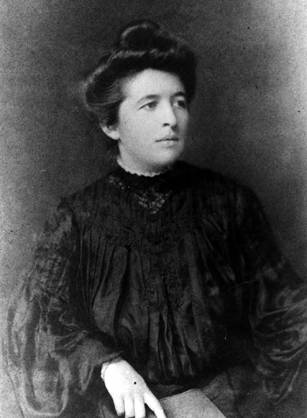Dorothy Mabel Reed Mendenhall
Dorothy Mabel Reed Mendenhall (September 22, 1874 – July 31, 1964) was an influential American physician, pathologist, and public health advocate. She is best known for her pioneering work in the field of pediatrics, particularly her research on Hodgkin's disease, which led to the identification of the Reed-Sternberg cell, a key diagnostic marker for the disease. Her contributions to medicine and public health have had a lasting impact, making her one of the notable figures in the history of medical science.
Early Life and Education[edit | edit source]
Dorothy Mabel Reed was born in Columbus, Ohio, to a family with a strong emphasis on education. She pursued her undergraduate studies at Wellesley College, where she developed an interest in biology and medicine. After completing her bachelor's degree, Reed faced the challenges of entering a profession that was, at the time, largely dominated by men. Undeterred, she enrolled at the Johns Hopkins University School of Medicine, one of the few medical schools that accepted female students. She graduated in 1900, distinguishing herself as a brilliant student and researcher.
Career and Research[edit | edit source]
After completing her medical degree, Reed joined the Johns Hopkins Hospital as a pathologist, where she worked under the guidance of William H. Welch, a prominent figure in American medicine. It was during this time that she conducted her seminal research on Hodgkin's disease. In 1902, she published a paper detailing her findings on the disease's pathology, including the description of the characteristic cells that would later be named Reed-Sternberg cells in her honor. This discovery was a significant breakthrough in the understanding of Hodgkin's disease and remains a cornerstone in its diagnosis. Reed's career also focused on improving child healthcare and nutrition. She worked in various public health roles, advocating for better health conditions for children and families. Her efforts contributed to the establishment of standards for milk quality and the promotion of breastfeeding, highlighting the importance of early childhood nutrition.
Later Life and Legacy[edit | edit source]
Dorothy Reed Mendenhall's later years were dedicated to public health advocacy, particularly in the area of maternal and child health. She married Charles Elwood Mendenhall, a physicist, and balanced her professional work with her responsibilities as a mother and wife, at a time when such a balance was rare for women in her field. Reed Mendenhall's legacy is marked by her contributions to medical science and public health. Her work paved the way for future generations of women in medicine and highlighted the importance of pathology in the diagnosis and understanding of diseases. She passed away on July 31, 1964, leaving behind a legacy of scientific achievement and advocacy for health.
See Also[edit | edit source]
Navigation: Wellness - Encyclopedia - Health topics - Disease Index - Drugs - World Directory - Gray's Anatomy - Keto diet - Recipes
Search WikiMD
Ad.Tired of being Overweight? Try W8MD's physician weight loss program.
Semaglutide (Ozempic / Wegovy and Tirzepatide (Mounjaro / Zepbound) available.
Advertise on WikiMD
WikiMD is not a substitute for professional medical advice. See full disclaimer.
Credits:Most images are courtesy of Wikimedia commons, and templates Wikipedia, licensed under CC BY SA or similar.Contributors: Prab R. Tumpati, MD

